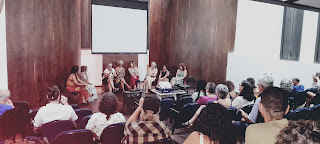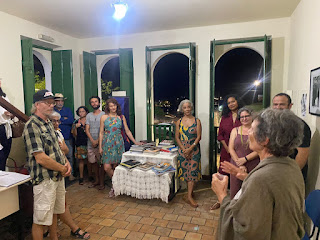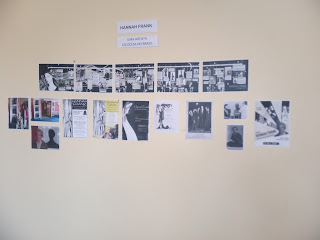Coming up to the end of my 3 months in Salvador
It's been nearly four weeks since my last proper post (the last post got in there so you'd know I was still alive!)
There was so much going on pre - and during - carnival that I never had any time or inclination to just reflect - most days I hardly knew what day it was and collapsed into bed exhausted, ready to get up and rush off for the next day's packed programme. .... Now Carnival is over, you'd think it would be 'rest time' (i was told yesterday that it's officially 'depression time' ) but the city council has launched a series of Summer Concerts, yesterday being an amazing one with the fabulous Afro Brazilian group Ile Aiye - they've been going since the 1970s and were the first group to only have Black members. Black people here talk about not being 'slaves' but being 'descended from kings and queens' (I've put this in inverted commas but can't find any references, it's definitely something I've heard though)... and watching Ile Aiye, the links shining through to African power and royalty it is so, so obvious and powerful.
So now I'm having a 'recovering' week I think, after the hecticness of Carnival.
I have however set up a day later this week up in the countryside about an hour away learning Brazilian melodeon riffs with this guy...
so will report back!
Last week I went back to Lençóis for three days to set up and open the latest Hannah Frank exhibition there. It's really beautiful, it's in the Casa Afranio Peixoto which I wrote about in a previous blog. I did a bit of a talk in the gallery and then we went to the AUDITORIUM where we showed the beautiful film about my aunt made by Sarah Thomas (you can see it here https://www.youtube.com/watch?v=5U42XfPTNnA - with English and Portuguese subtitles). After the film there was a discussion with ten local women artists about women and art, and the role of art in society .... and I contributed IN PORTUGUESE! (well, in Portuguese till I ran out of steam and confidence and then let Paola the bilingual curator, who had a Welsh mother, help out.
The exhibition looks fantastic - we included a small size printout of the timeline as well as some old exhibition posters, and photos - and what's so amazing about the 'go with the flow'ness of Brazil is that we only sorted out the timing for this opening at 9 a.m. on the day itself, and we got the ten women to talk about their art and another 27 people through the door to be part of the event.
Here's the exhibition itself
and this is me and Paola the curator at the talk the night before...
And finally, here's the man in the artisan locally made liqueur shop - Paola made me go there and choose the basis for the refreshments out of ALL his products (we went for Jenipapo in the end, one of the many Brazilian tropical fruits that I have never heard of and can't translate).... It's a hard life, being an art exhibition organiser, but someone has to do it :-)
---
Carnival Capers - the main event
If you fancy a trip to Salvador carnival, it doesn't need to cost anything at all, except for your accommodation and food and local travel (of course that's all far more expensive during carnival time, but that's another story). You don't need to buy special seats or special costumes , you can just hang out in Barra, Rio Grande and/or Pelourinho and watch everything go by.
However in Barra it's UNBELIEVABLY RAMMED
and you might not actually want to be out there on the streets, doing what they call pipoca (popcorn), ie running around uncontrolled.
You might either want to pay for a CAMEROTE or go in a BLOCO.
Camerotes are seated protected areas quite high up. Some of them serve unlimited food and drink, and doing makeup and massages and more musical entertainment for their guests. Some are just seats.
And Blocos are.... well, you buy a tshirt or a more elaborate costume (called abadá) and follow behind the band of your choice, with lots of other people wearing the same costume. you are coralled inside a sort of eruv, ie a rope that keeps you with the band and apart from the rabble in the street! The rope is handled by a team of people with tshirts saying things like 'Rope Men' (homens da corda) - also worn by the women. Wish i'd got a photo, it looked so odd.
I decided I wanted to treat myself to a Camerote on one night, and also I was recommended the Bloco of Cortejo Afro. I'd been to one of their concets and it was FABFABFAB.
my cheapo two-sim android phone, while very handy for walking round the streets of Brazil, has TERRIBLE sound recording quality sadly. I brought my iphone with me too (with wonderful sound recording quality) but don't take it out with me. So sadly i can't play you a recording of the concert...Here's a bit of them on youtube
The 'Abada' for Cortejo Afro was quite expensive, but they were going out on three nights so I reckoned it was ok. Also they use the money to support community projects throughout the year. And it was absolutely BEAUTIFUL - a three piece specially designed costume that I'll be bringing out in Lancaster in future...
and I already showed you a pic of me walking in the 'bloco' last week wearing this...
I didn't really do much with mine except tuck the sleeves in, but there's a whole industry based on customising your Abada - you took the special bloco tshirt to a tailor and got it turned into a strappy top, a dress, a skirt, a bikini top, or just having interesting holes cut in it.... see more here.
You can see the rope and the rope holders at the very beginning of this video
I was doing this bloco the first day with Josh, one of my fellow language school students, and his friend from the US... and then a couple in my current Airbnb were going to do a Camerote for a couple of nights and invited me to go with them. It was easily the most expensive night out I've ever done in my life, (not even counting the THREE taxi rides I had to do to pick up my 'abada'/to get in.... having misunderstood where I was meant to pick it up). So I decided it was going to be a very early birthday present to myself. (My birthday is in September...) but on the same day, I got news of being offered homestay for part of my Montreal visit during September with some Cohousers from a forming community who want to pick my brains about setting up and living in a cohousing project {in French], so that might all 'come out in the wash' as they say.
So I'm VERY comfortable with having spent the money now. Though a free bar is, sadly, rather lost on me these days. I did manage to make fourths on the food, but they were very small plates.
The Barra (pronounced Baha, nothing to do with the outer Hebrides) carnival is mostly big floats with big shiny bands... the Pelourinho carnival is more like this...with different groups popping up all over the place in the little back streets, sometimes you'd be standing somewhere and be able to hear five different bands all echoing for position... the below starts off with Dida - a fabulous African Women's dance/music collective - in Campo Grande and then goes to Pelourinho
It seems ages since I was at the language school (probably only 2 weeks), but that was an incredibly good move to choose to spend three weeks focussing on grammar, and getting technical support with pronunciation and intonation. I feel more comfortable knowing that at least I have a book which would tell me whether to use Para or Por, for example (if I could be bothered to look it up): I certainly need that sort of thing at least twice a day.
One week we'd been learning the different use of different past tenses. Portuguese is unbelievably complicated when it comes to, eg, the pluperfect , it's not quite the same as ours, and I was trying hard to get my head round it.
Anyway every morning we had to tell the class what we'd done the day before and I told her that I'd been to a Holocaust Memorial event the evening before (which was organised by the local Jewish community, and had been a really excellent and moving event.). There were three short films presented there, including a Tupinambi indigenous woman who had the exact same experiences as the holocaust survivor who was reading her words, which could have been her own. . Here's that film (in portuguese) https://www.youtube.com/watch?v=0vG7NUpLqos and here's one in exactly the same mode, that was made by the Scottish Refugee Council helped by the Scottish Jewish Archives Centre, a few years ago... featuring Rosa Sacharin and Christian Kasubandi https://www.scojec.org/news/2011/11vi_src/src.html
Our teacher, Catia, was really moved by this and said 'yes, we're really not learning the lessons of the past' ("não estamos aprendendo as lições do passado"). . At first I thought she was telling me that I had been describing it using the wrong past tenses, as 'I hadn't learned the lesson about the past' - but no, she was being philosophical about the topic. (I expect I was using the wrong tenses, but I thought that was quite an amusing little grammar-story)
Iemanjá
Being Addressed as an Older Woman
Tia! (auntie) Amiga! (friend, of course) A Senhora! (sort of 'Madam'). I'm actually quite happy to get any of those, because what I was told before I set off was that I'd get 'Avó' (grandma) and that absolutely hasn't happened.
What HAS happened is that this is such a civilised country that older women get to the front of the queue in, for example, Camerote Toilets (what's not to like!)
any comments to fionaistravelling.gmail.com
and if anyone would like to be part of a whatsapp group and get more frequent updates, it's here...
https://chat.whatsapp.com/IAilrufbWa91GyEIDBrE6x

.jpeg)

.jpeg)







.jpeg)












.JPEG)


Comments
Post a Comment